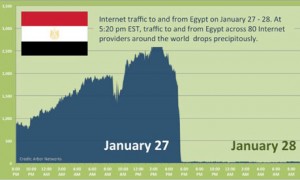
Decentralizing the Internet So Big Brother Can’t Find You
Jim Dwyer
The New York Times, February 15, 2011
On Tuesday afternoon, as Secretary of State Hillary Rodham Clinton spoke in Washington about the Internet and human liberty, a Columbia law professor in Manhattan, Eben Moglen, was putting together a shopping list to rebuild the Internet — this time, without governments and big companies able to watch every twitch of our fingers.

The list begins with “cheap, small, low-power plug servers,” Mr. Moglen said. “A small device the size of a cellphone charger, running on a low-power chip. You plug it into the wall and forget about it.”
. . . . . . .
Put free software into the little plug server in the wall, and you would have a Freedom Box that would decentralize information and power, Mr. Moglen said. This month, he created the Freedom Box Foundation to organize the software.
. . . . . . .
Social networking has changed the balance of political power, he said, “but everything we know about technology tells us that the current forms of social network communication, despite their enormous current value for politics, are also intensely dangerous to use. They are too centralized; they are too vulnerable to state retaliation and control.”
Continue reading “Decentralizing the Internet So Big Brother Can’t …”







